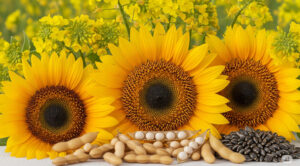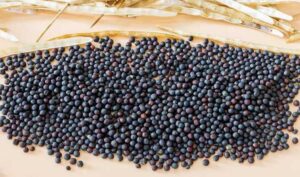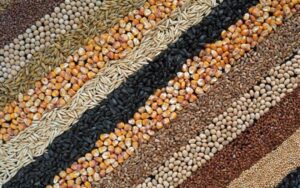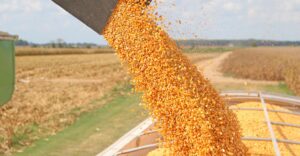
Foreign exchange earnings from rapeseed oil exports from Ukraine in the second half of 2025 increased 2.2 times compared to the same period of the previous season, while rapeseed meal revenues increased 1.4 times, according to Dmytro Kysilevsky, deputy chairman of the Verkhovna Rada Committee on Economic Development, citing data from the Ukroliyaprom association.
“The introduction of a 10% export duty on soybeans and rapeseed has allowed Ukraine to increase the production of oil and meal from these raw materials, as well as to increase exports of processed products,” he wrote on Facebook.
According to the association’s data, in July-December 2025, rapeseed processing into oil increased 1.8 times. In the soybean segment, in September-December 2025, oil production increased by 22.4%, exports by 23.3%, and foreign exchange earnings by 1.5 times.
“The processing of soybeans into oil and meal exceeded its exports by 3.7%,” the parliamentarian emphasized.
Ukroliyaprom predicts that in the 2025-2026 marketing year (MY, July-June), rapeseed processing will reach a record 1.7 million tons (over 50% of the gross harvest), and soybeans — 3.0 million tons (over 60%). This will ensure the production of 720,000 tons of rapeseed oil and 600,000 tons of soybean oil.
Kysilevsky emphasized that the processing model proved its effectiveness in the very first season of the duty law, providing billions of hryvnias in taxes. He also recalled the support programs “Made in Ukraine,” in particular, “5-7-9” loans and 25% compensation for the cost of agricultural machinery.

The elevators of the Zakhidny Bug group of companies received over 320,000 tons of grain in 2025, according to a Facebook post by the agricultural holding’s press service.
According to the report, the Zakhidny Bug seed plant produced over 13,000 tons of seeds in 2025.
In total, the group’s fields harvested 82,700 tons of winter wheat, 77,500 tons of corn, 26,700 tons of barley, 70,000 tons of soybeans, and 22,300 tons of rapeseed in 2025. The company also harvested hard wheat varieties: 18,200 tons of winter wheat and 3,450 tons of spring wheat.
PP “Zakhidny Bug” was founded in 2003 and specializes in growing grain and industrial crops. It owns a land bank of 65,000 hectares in the Lviv, Chernivtsi, Ternopil, and Volyn regions.
The company is building Ukraine’s first mill to process durum wheat, as well as a pasta factory. The projected capacity of the first stage of the mill is 80 tons per day for durum wheat and 150 tons per day for soft wheat varieties. The second stage will increase the capacity by another 200 tons for durum wheat and 300 tons for soft varieties. The total investment in the project is UAH 1 billion.
The beneficiaries of the enterprise are Oksana Drul (30%), Valery Ovcharuk (30%), and Yuriy Gladun (30%).

Rapeseed processing in Ukraine in 2024/2025 MY amounted to 0.5 million tons, or 14% of rapeseed production, according to the Ukroliyaprom association.
“It was not possible to use rapeseed for processing, as in the previous marketing year (when a record amount of over 1.0 million tons was processed), due to its massive export (almost 90% of its production). 3.1 million tons of rapeseed were exported, or over 86% of its production. Only over 0.5 million tons, or 14% of rapeseed production, was processed,” the industry association said.
Ukroliyaprom added that rapeseed oil exports in the 2024/2025 season amounted to 210,400 tons, worth $194 million, of which 153,500 tons (worth $144.1 million) were shipped to EU countries.
The top 10 countries purchasing Ukrainian rapeseed oil included China (48.3 thousand tons), Poland (46.1 thousand tons), Belgium (26.5 thousand tons), Lithuania (23.1 thousand tons), the Netherlands (15.2 thousand tons), Spain (13 thousand tons), Italy (9 thousand tons), Bulgaria (8.2 thousand tons), Germany (4.3 thousand tons), and Latvia (3.6 thousand tons).
Exports of rapeseed meal in 2024/2025 MY amounted to 218.5 thousand tons worth $53.9 million at an average price of $246.7 per ton. At the same time, 86.9% of rapeseed meal was supplied to EU countries, 9.9% was purchased by Israel, and 3.2% by Turkey.
The main importers of rapeseed meal were Spain (95.7 thousand tons), Hungary (39.7 thousand tons), Lithuania (21.4 thousand tons), France (15 thousand tons), Italy (5.9 thousand tons), Poland (5.5 thousand tons), Israel (21.8 thousand tons), and Turkey (6.9 thousand tons).
The processing season for rapeseed harvested in 2025 began in July of this year. In July-August, only about 60 thousand tons of rapeseed were processed into oil, which allowed for the production and export of 25.0 thousand tons of rapeseed oil.
At the same time, in September 2025, under the conditions of export duties on rapeseed, its processing at domestic enterprises increased to a record monthly volume of 250 thousand tons. According to Ukroliyaprom’s estimates, production reached 120,000 tons, of which 108,800 tons were exported for $121.9 million. This represents a 2.8- and 3.3-fold increase over the same period last year. The cost of one ton of exported oil increased in the current marketing year compared to the previous one to $1,120.4 per ton, or by $171.4 per ton.
The main consumers of Ukrainian rapeseed oil in September 2025 were EU countries, which imported 92 thousand tons from Ukraine, or 84.5% of the total exports of this product from Ukraine.
Among EU countries, the largest importers were the Netherlands, which purchased 29,000 tons of rapeseed oil, accounting for 27% of total exports, Belgium – 15,500 tons (14.2%), Spain – 14, 4 thousand tons (13.2%), and Poland – 13.5 thousand tons (12.4%).
16.8 thousand tons (15.5%) were exported to other countries, in particular, 13.9 thousand tons (15.5%) were exported to Singapore.
Ukroliyaprom reminded that on September 4, 2025, amendments to the law “On Export Duty Rates on Seeds of Certain Oil Crops” came into force, approving export duty rates of 10% of the customs value of goods for soybeans (UKTZED code 1201) and rapeseed (UKTZED code 1205). The association expressed hope for further positive results in the processing of rapeseed and soybeans, provided that the conditions for their processing remain in place.

Today, June 12, the Council of the European Union recognized the equivalence of Ukrainian standards for the production of beet, sunflower, rapeseed, and soybean seeds with European requirements, according to the press service of the Council of the EU.
According to this decision, seeds of these crops produced in Ukraine will be able to enter the EU market. This means that EU-based companies will be able to diversify their seed production areas. The new rules will also help to maintain a continuous supply of high-quality seeds to the EU.
“The decision grants equivalence to beet, sunflower, turnip, and soybean seeds produced and certified in Ukraine, fodder plant seeds produced in the Republic of Moldova and officially certified by its authorities, as well as to the corresponding field inspections carried out. The equivalence confirms that the national procedures of the two countries offer the same guarantees regarding seed characteristics and rules for seed examination, identification, and control as those applicable to seeds harvested in the EU,” the statement said.
Moldova has received similar permission for fodder plant seeds.
The decision will enter into force 20 days after its publication in the Official Journal of the EU.

The Ministry of Agrarian Policy and Food, together with the international company Bayer and the All-Ukrainian Association of Communities, has launched a seed program that will provide free corn seeds for the spring sowing season to farmers in Donetsk, Zaporizhzhia, Sumy, Kharkiv and Chernihiv regions (excluding the temporarily occupied territories).
“This initiative is another step towards strengthening Ukraine’s food security in times of war, as it will allow farmers from the frontline and de-occupied territories to sow approximately 10 thousand hectares and harvest approximately 120 thousand tons of grain,” the Ministry of Agrarian Policy emphasized.
According to the ministry, to receive assistance, a farm must be registered in the State Agrarian Register (SAR) and cultivate from 5 hectares to 500 hectares in the specified areas.
Applications will be accepted from April 21 to April 30 or until the amount of assistance is exhausted. Each approved applicant will be able to receive up to 25 sowing units of corn seeds (1 sowing unit per 1 ha) depending on the area of land under cultivation. Seed distribution will begin in early May and will last approximately two weeks.

In 2024, Ukraine increased its total imports of seeds of grains and oilseeds, sugar beets and vegetables to $381.3 million, which is 3.2% more than a year earlier, the press service of the National Research Center Institute of Agrarian Economics (IAE) reported.
According to the report, in 2024 Ukraine imported 8.6 thousand tons of grain seeds and 22.2 thousand tons of oilseeds totaling $302.3 million. Scientists noted that compared to 2023, the cost of imports of these crops decreased by 3.8%, but it is almost 2.5 times higher than domestic exports of seeds, which amounted to $122.6 million.
In addition, sugar beet seeds worth $50.1 million and vegetable seeds worth almost $28.9 million were purchased abroad.
“The volume of purchases of foreign-bred seeds of grains and oilseeds has been gradually decreasing since 2022, while imports of sugar beet and vegetable seeds have been on the rise for three consecutive years,” the scientists emphasized.
According to their information, in 2023, 727 tons of sugar beet seeds were imported for the amount of $32.8 million, and last year the volume of purchases of this type of agricultural products increased by 52.7% and amounted to almost 973 tons. At the same time, the price of sugar beet seeds in 2024 increased to $51493 per ton compared to $45117 per ton a year earlier.
According to the IAEA, the volume of imported seeds fully covers the needs of domestic farmers, as it will allow to allocate more than 300 thsd ha of farmland for sugar beet in 2025. For comparison, in 2023-2024, the area under sugar beet was 220-250 thousand hectares.
In addition, the value of imported vegetable seeds increased by 27.3% last year compared to the previous year and amounted to $28.9 mln. In physical terms, purchases increased by 17.2% to 945 tons.
“Thus, in 2024, due to the increase in the cost of purchasing sugar beet and vegetable seeds abroad, total seed imports increased by 3.2%. The increase in the cost of imports was largely due to the purchase of higher quality seeds and higher categories of additive and basic forms, which are traditionally several times more expensive than certified seeds of different years of certification,” the Institute of Agrarian Economics summarized.